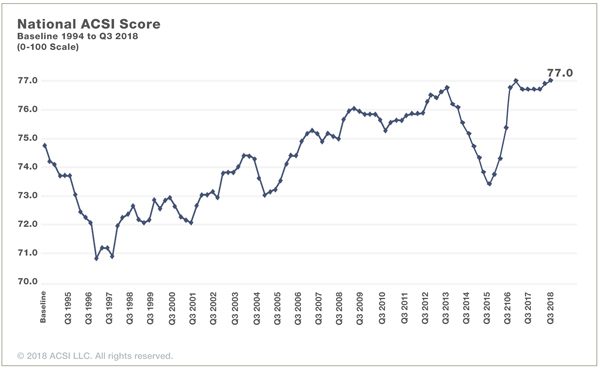ANN ARBOR, Mich. (December 11, 2018) – Overall U.S. customer satisfaction barely moved in the third quarter – up 0.1 percent to a score of 77.0 on the American Customer Satisfaction Index (ACSI®). The score is the result of weighting and combining ACSI data for 46 industries and 10 sectors that make up almost all of the consumer economy. It follows a 0.3 percent increase in the second quarter of 2018.
“Economic growth continues to be strong, but like the ACSI, at a declining rate. Because of the weakness in business investment and labor productivity, customer satisfaction and consumer spending growth will be even more critical than usual,” said Claes Fornell, ACSI Founder and Chairman. “The uncertainty around trade, the stock market, and interest rates doesn’t help.”
Consumer spending growth doesn’t depend solely on the (expected) satisfaction buyers get from consumption. It also depends on wage growth, inflation, ability to borrow, and interest rates. Wage growth, in turn, depends, to a large extent, on productivity growth. But if the weakness in productivity continues, it’s difficult to see how wages can get a significant boost. However, despite the lack of productivity growth, wages have finally started to increase due to more competition for labor. This is important because there is little room for more consumer borrowing, the other major source for spending.
Household debt is already at record levels and interest rates continue to rise. There are also signs that inflation is on the rise. The key will be how much of the increase in take-home pay is going to be negated by inflation. Over the long term, wage increases may not go much further unless productivity improves. For the short term, the economy is exceedingly difficult to predict. Nevertheless, the ACSI model suggests that consumer spending will grow at an annualized rate of 3.3 percent this quarter, but the rate of GDP growth will decline slightly.
The national ACSI score reflects customer satisfaction across sectors and industries over a rolling 12-month period.

This press release is also available in PDF format.